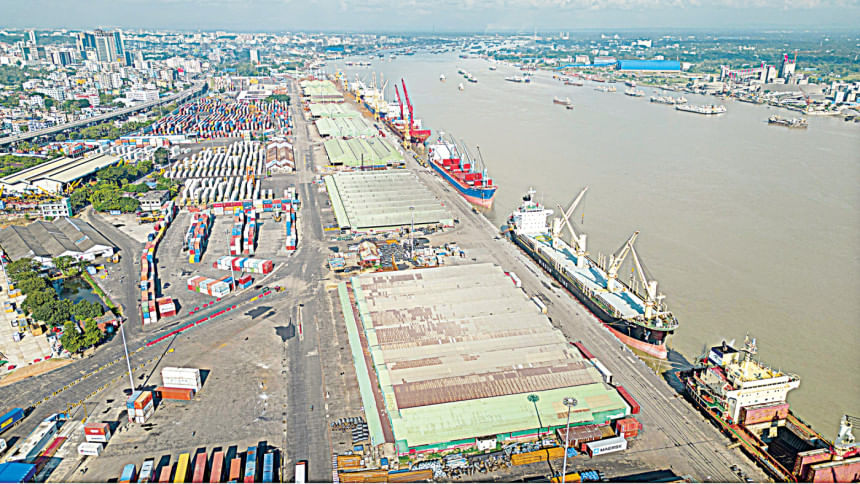Strikes at Ctg port end but leave scars

Operations at the country's main trade gateway faced significant disruption following a series of wildcat transport strikes and work abstentions, which ended yesterday, leaving hundreds of export containers stranded, ships departing half-empty, and import deliveries falling to a trickle.According to port sources, over 3,600 TEUs (twenty-foot equivalent unit) of import containers accumulated at port yards as the unrest brought normal cargo movement to a near halt, affecting traders and the wider...
Operations at the country's main trade gateway faced significant disruption following a series of wildcat transport strikes and work abstentions, which ended yesterday, leaving hundreds of export containers stranded, ships departing half-empty, and import deliveries falling to a trickle.
According to port sources, over 3,600 TEUs (twenty-foot equivalent unit) of import containers accumulated at port yards as the unrest brought normal cargo movement to a near halt, affecting traders and the wider supply chain.
Khairul Alam Suzan, former vice president of Bangladesh Freight Forwarders Association, said the import backlog is expected to be cleared within two-three days if delivery resumes smoothly as the daily delivery capacity can go up to 5,000 TEUs.
"However, the backlog of export containers might take longer, and if not resolved shortly, this might portray a bad image of the port operations," he added.
The disruption began last week when owners of container-carrying prime mover trailers partially halted operations on Wednesday afternoon following a sudden fourfold increase in port entry fees by the Chittagong Port Authority (CPA).
The regulatory body raised charges, as per the recently revised tariff schedule, for heavy vehicles, including trucks, covered vans, and prime mover trailers, from Tk 57.50 to Tk 230 per vehicle — a 300 percent hike.
Light vehicle fees were also increased from Tk 23 to Tk 115 per vehicle, while licence fees were raised, prompting widespread opposition from transport owners and stakeholders.
Truck and covered van owners escalated the protest on Saturday morning, joining the ongoing strike and effectively halting the movement of all types of cargo to and from the port.
The situation worsened yesterday when customs clearing and forwarding (C&F) staff enforced a four-hour work abstention from 9:00am, protesting the increased entry fees for light vehicles and higher license charges. As a result, normal cargo operations remained suspended for at least 35 hours.
The impact on exports was immediate and severe. A total of 944 TEUs of export containers missed their scheduled sailings, forcing five vessels, including the Colombo-bound Sol Resilience, to depart without them.
The Sol Resilience alone left 170 TEUs behind, according to Muntasir Rubayat, head of operations at the ship's local agent, GBX Logistics.
Rubayat said the vessel could not defer departure as it had already been berthed at the jetty for three days and needed to maintain its schedule to connect with the mother vessel at Colombo by October 24.
Other depots reported similar losses. AKM Abdul Hadi, operations manager of ICD Nemson Container Ltd, said at least 160 TEUs of export-laden containers from their depot missed the scheduled sailings of these five ships.
The delays are expected to ripple through the supply chain, as export cargo unable to reach transshipment ports on time may incur additional costs, including airfreight charges or penalties from buyers.
Nasir Uddin Chowdhury, former first vice-president of the Bangladesh Garment Manufacturers and Exporters Association (BGMEA), said most of the export cargo stranded at the port is unlikely to connect with their mother vessels at transshipment ports, potentially resulting in delays and additional expenses for exporters.
"Buyers in such cases often seek discounts, leaving exporters with little option but to incur extra costs," he added.
Import operations were equally affected. On-chassis delivery of import containers, where goods are transported directly from the port to the importer's factory, fell drastically.
Sources at the port said only 10-15 TEUs were delivered per day over the three-day disruption, compared to an average of 600-900 TEUs daily. The sudden suspension of goods-carrying vehicles left factories waiting for critical raw materials and supplies, creating a backlog of over 3,600 TEUs at port yards.
The congestion further strained logistics operations and delayed downstream production for multiple industries.
Following a meeting with the CPA chairman yesterday afternoon, transport owners withdrew their strike, allowing cargo operations to gradually resume after 4:00pm. The authority also temporarily suspended the increased fees pending a decision by the CPA board, following instructions from the government.
Shamsuzzaman Suman, president of the Inter-district Truck Covered Van Owners' Association, said he hopes that the government will take a "wise decision" to reinstate the fees at their previous rates.
Industry representatives, however, fear that the disruption has already caused substantial financial and logistical damage.
The sudden implementation of the revised port tariff structure caused "chaos in operations," despite objections from businesses, port users, and stakeholders, said SM Abu Tayyab, president of the International Business Forum.
He urged the government to review the tariff schedule to prevent future operational crises at the port.